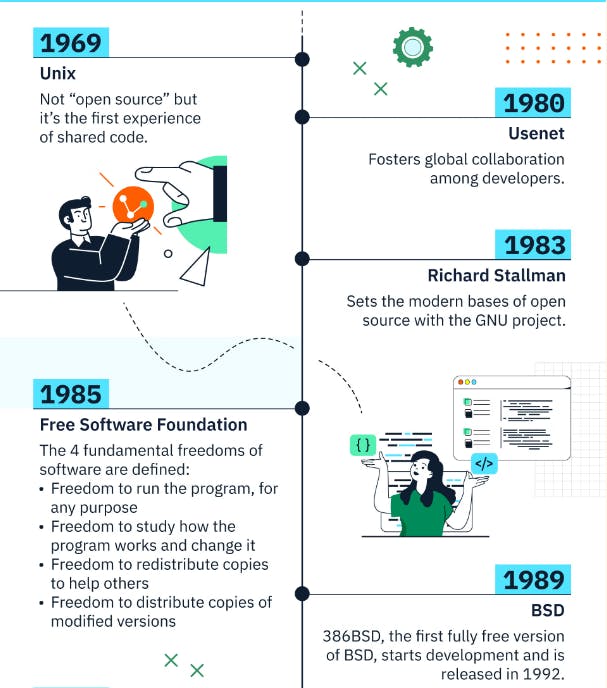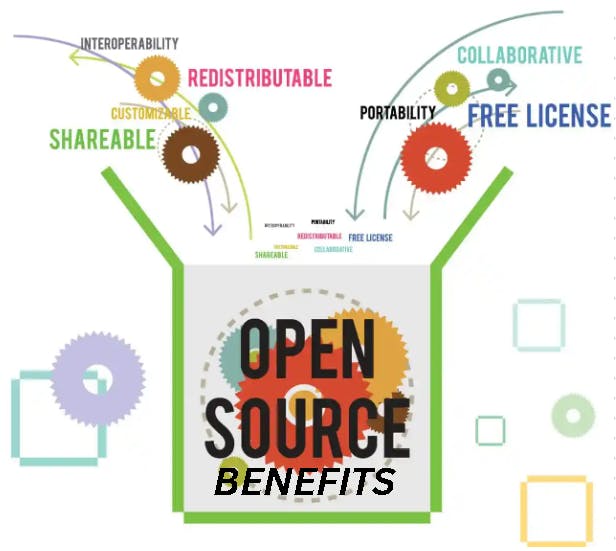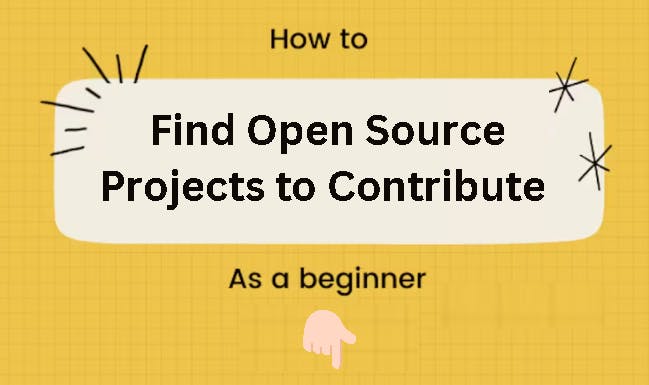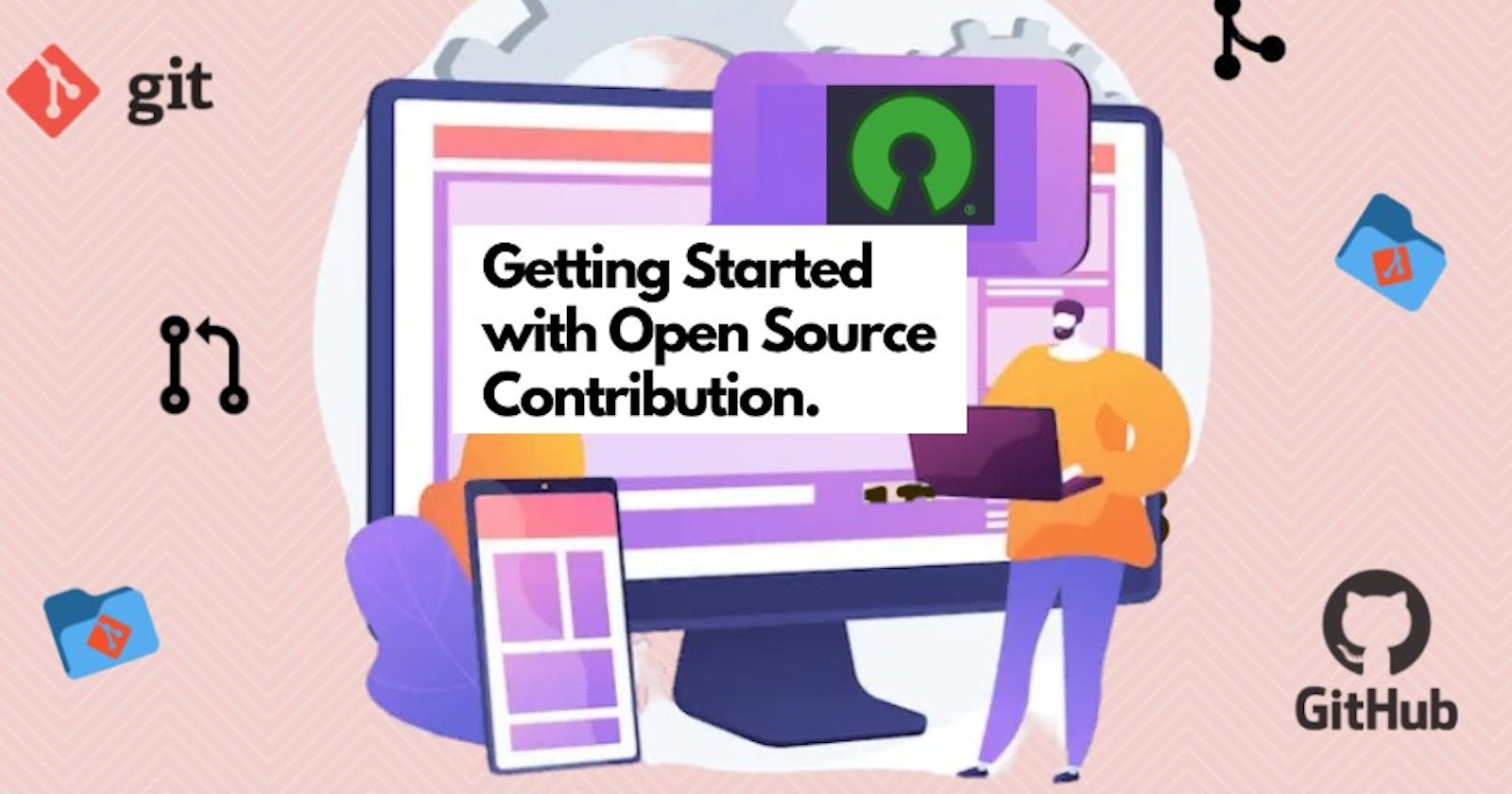Table of contents
- History of Open source
- Why to contribute and who should contribute to open source projects:
- Benefits of contributing to open-source projects
- How to Find Open-Source Projects to Contribute To:
- How to Contribute:
- Step 1: Read the Project's Documentation
- Step 2: Set Up the Development Environment
- Step 3: Find an Issue or Feature to Work On
- Step 4: Discuss the Issue with the Project Maintainers and Other Contributors
- Step 5: Write Code to Fix the Issue or Implement the Feature
- Step 6: Submit a Pull Request
- Step 7: Respond to Feedback and Make Changes
- Step 8: Celebrate Your Contribution!
- Best Practices for Contributing to Open Source Projects
- Overcoming Challenges
- Recognition and Rewards for Contributors
- Wrap up 🎉
Open source contribution is the act of collaborating and sharing one's expertise, code, or resources with the larger community. It involves participating in projects, developing software, and enhancing existing programs for the benefit of all. Engaging in open source contribution promotes innovation, creativity, and the collective advancement of technology. By working together with like-minded individuals, developers can create impactful solutions and address real-world challenges. The principles of transparency, collaboration, and inclusivity are at the core of open source contribution, fostering a supportive environment for diverse perspectives and skill sets to thrive.
Even though I am not a pro at contributing to open source as of now, but I am on a mission to get there and want to share all the challenges I face and the improvements I make in this journey with beginners and like-minded people. (Give it a read even if you are already a pro at it 😅)
Let's start from the beginning...
History of Open source
1969: Unix is created by Ken Thompson at Bell Labs. It was not open source, but it is considered the first experience of shared code.
1980: Usenet is created, which provides a platform for people to discuss and share information on various topics.
1983: Richard Stallman sets the modern bases of open source with the GNU project.
1985: The Free Software Foundation is created by Richard Stallman, which defines the 4 fundamental freedoms of software.
1989: BSD (Berkeley Software Distribution) starts development and is released in 1992 as the first fully free version of Unix.

1991: Linus Torvalds announces the creation of a free OS kernel (Linux).
1993: Red Hat, the first big commercial success of open source, is created.
1995: MySQL is released and becomes the most used open source database solution. HTTP Apache software engineers start collaborating to create HTTP Apache.
1998: The definition of open source is widely adopted in the IT world by the Open Source Initiative. Mozilla, the open source web browser, appears and changes the history of the Internet.

2004: Ubuntu, the most widely used Linux distribution, arrives.
2007: Sun Microsystems releases the Java Development Kit as OpenJDK.
2008: Git repositories become available on GitHub, and the US Court establishes that open-source code can be protected under copyright laws.
2014: GitLab is born, and Google's open source container orchestrator, Kubernetes, makes its arrival.
2015: After opposing open source for decades, Git starts open sourcing projects such as .NET Framework.
2018: Microsoft acquires GitHub, the largest host for open source infrastructure, fostering global collaboration among developers.

Why to contribute and who should contribute to open source projects:
It is really important to realize that it's a wonderful opportunity. However, it's also very important for us to know who are really intended to participate/contribute in it...

Developers and Programmers: Individuals who are passionate about coding and software development can contribute to open source projects. Their expertise and creativity can help enhance existing projects or create new ones that benefit the community.
Tech Enthusiasts: Even those who are not professional developers but have a keen interest in technology can contribute to open source. They can offer valuable insights, user experience feedback, and testing support for various projects.
Students and Learners: Open source projects provide an excellent platform for students and learners to apply their knowledge in a real-world setting. Contributing to open source allows them to gain practical experience, build their portfolios, and learn from industry professionals.
However, if you aren't one of them still give it a try,
Benefits of contributing to open-source projects
Open-source contributions have a lot of benefits but down below are some of the more visual once's and that I have personally experienced...

Skill Enhancement
Contributing to open source projects provides the opportunity to enhance technical skills. It allows individuals to work on real-world projects, learn from peers, and gain hands-on experience with the latest tools and technologies.
Professional Networking
Open source contributions facilitate networking with industry professionals, potential employers, and like-minded individuals. It offers a platform to collaborate, share knowledge, and build valuable connections within the tech community.
Portfolio Development
By contributing to open source projects, individuals can build a strong portfolio showcasing their expertise, problem-solving abilities, and collaborative skills. This portfolio can enhance career opportunities and attract potential employers.
Personal Growth
Open source contribution promotes personal growth by fostering a mindset of continuous learning, adaptability, and creativity. Individuals can gain confidence, improve communication skills, and develop a deeper understanding of software development processes.
Now, before starting to contribute we need to know how and where to contribute and on which project..
How to Find Open-Source Projects to Contribute To:

Several platforms and resources exist to guide and connect aspiring contributors with suitable projects such as:
Online Platforms
Explore GitHub, GitLab, and Bitbucket for projects with open issues tagged "help wanted" or "good first issue."
If you want to know more about GitHub and GitLab you can visit 👇🏻and follow
Use websites like Up For Grabs and First Timers Only to find beginner-friendly projects to contribute to.
Participate in open source hackathons and community events to discover new projects and connect with fellow contributors.
Project Directories
Check out curated lists of open source projects in directories like Awesome Lists, Open Source Friday, and CodeTriage. These directories categorize projects based on technologies and programming languages, making it easier to find a project aligned with your interests and skills.
Contributor Networks
Engage with open source contributor networks and forums such as Reddit's r/opensource and r/github, Stack Overflow, and the Mozilla Developer Network (MDN). These platforms not only provide project recommendations but also offer support and guidance for new contributors.
-> Exploring and discovering new projects, engaging with the community, and embracing the principles of open source can lay a strong foundation for your journey into open source contribution.
Now that you have selected a project to contribute to, it time to know
How to Contribute:

Step 1: Read the Project's Documentation
Start by reading the project's contributing guidelines, code of conduct, and any other relevant documentation to understand how the project works and what the expectations are for contributions.
Step 2: Set Up the Development Environment
Follow the instructions in the project's documentation to set up your development environment.
Step 3: Find an Issue or Feature to Work On
Look for issues labeled as "good first issue" or "help wanted" if you're new to the project. Choose an issue or feature that interests you and that you feel comfortable working on.
Step 4: Discuss the Issue with the Project Maintainers and Other Contributors
If you have questions or need help, don't be afraid to ask the project maintainers or other contributors. You can ask for help in the issue thread, in the project's chat room, or in other communication channels provided by the project.
Step 5: Write Code to Fix the Issue or Implement the Feature
Follow the project's coding standards and guidelines to write code that addresses the issue or implements the feature. Make sure to write tests and documentation as needed.
Step 6: Submit a Pull Request
When you're ready for the project maintainers to review your code, submit a pull request. Make sure to include a clear description of what your code does and how it addresses the issue or implements the feature.
Step 7: Respond to Feedback and Make Changes
Be prepared to respond to feedback and make changes to your code as needed. The project maintainers may ask you to make changes before they will merge your code.
Step 8: Celebrate Your Contribution!

Congratulations! You've made a valuable contribution to an open source project.
There are different types of contributions you can make not all contribution requires coding, remember to start by picking up easy tasks...
Best Practices for Contributing to Open Source Projects
Collaboration
Open source contribution thrives on collaboration. Working with others to solve problems, share knowledge, and build something meaningful is at the core of open source projects. It's essential to maintain clear communication, show respect for diverse perspectives, and value the contributions of every team member.
Code Review
Thorough code reviews are crucial in maintaining the quality and security of open source projects. Paying attention to detail, providing constructive feedback, and embracing a culture of continuous improvement ensures that the codebase remains robust and reliable.

Documentation
Clear and comprehensive documentation is key to the success of an open source project. It enables new contributors to quickly understand the project's architecture, guidelines, and best practices. Effective documentation promotes transparency and empowers others to contribute effectively.
Continuous Learning
Embracing a culture of continuous learning is essential for open source contributors. Staying updated with the latest technologies, best practices, and industry trends ensures that contributions are innovative and impactful. It also fosters personal and professional growth within the community.
I am pretty sure even if you are following all the steps correctly, still you would face some challenges, and believe me or not that it is a good sign, that means you are on a right track...
Overcoming Challenges
Contributing is a rewarding experience, but it also comes with its own set of challenges. One common challenge is the fear of making mistakes or the imposter syndrome, where contributors may doubt their own skills and feel like they don't belong in the open source community. This can be addressed through mentorship and support from experienced contributors, as well as by fostering a culture of inclusivity and encouragement within the community.

Another challenge is finding the time to contribute, especially for individuals with busy schedules or multiple commitments. Balancing work, personal life, and open source participation can be daunting, but effective time management, setting realistic goals, and breaking down tasks into smaller, manageable chunks can help overcome this challenge.
Furthermore, communication and collaboration within distributed teams can pose challenges, as contributors from different time zones and cultural backgrounds work together on projects. Building effective communication channels, establishing clear guidelines, and promoting transparency can mitigate these challenges and foster a more harmonious and efficient collaboration.

Additionally, dealing with constructive feedback and addressing conflicting opinions can be challenging, but learning how to handle feedback constructively, maintaining a respectful attitude, and understanding that diverse perspectives are valuable assets can turn these challenges into opportunities for growth and learning.
Hey, look at you! You overcame all the challenges that you were facing while contributing, you definitely deserve some rewards and recognition...
Recognition and Rewards for Contributors

Gratitude and Acknowledgement
Open source contributors gets recognized and thanked for their valuable contributions. Expressing gratitude for their time and effort motivates them to continue contributing to the community.
Certificates and Badges
Many open source projects provide certificates or badges to contributors as a way to acknowledge their commitment and expertise. These accolades can be displayed on personal portfolios and profiles, highlighting their involvement in notable projects.
Speakership Opportunities
Outstanding contributors may be offered speaking opportunities at conferences and events related to open source and technology. This recognition allows them to share their knowledge and experiences with a wider audience.
Monetary Rewards
Some organizations offer financial incentives, such as stipends or sponsorships, to exceptional contributors. These rewards not only recognize their hard work but also support their continued participation in open source endeavors.
Now we come to an end, but before ending this blog, let's see what your next step should be...
Wrap up 🎉
As we embrace forward this journey into the world of open source contribution, it's essential to reflect on the impact of our efforts and consider the next steps in our contribution to the community. Embracing the spirit of collaboration and innovation, we have explored the history, benefits, and best practices of open source contribution, paving the way for a more inclusive and supportive developer ecosystem.
The next steps involve leveraging the knowledge gained to identify and engage with open source projects aligned with our interests and skills, fostering meaningful connections within the community, and continuing to learn and grow as open source contributors. Let's embark on this continuing adventure, armed with the passion to make a difference and the determination to shape a better, more open world through our contributions.

Thanks for reading!! 🥳If you like to read more of my technical blogs, click on this link.
